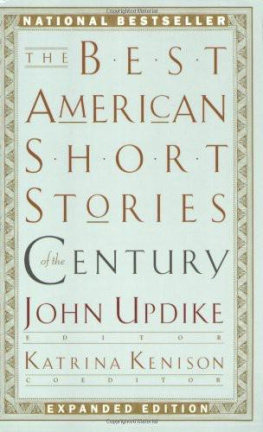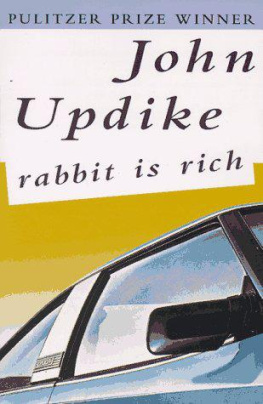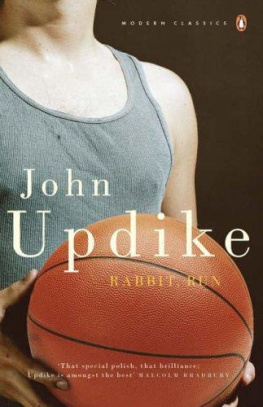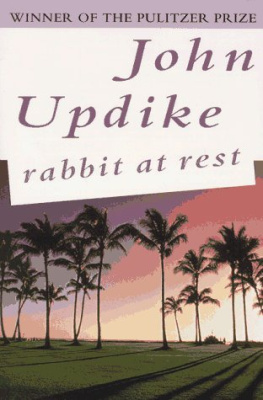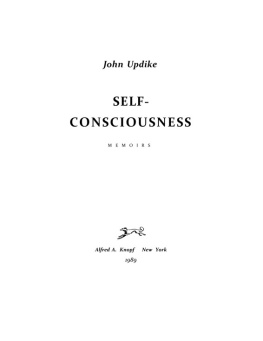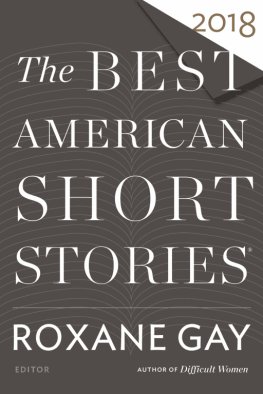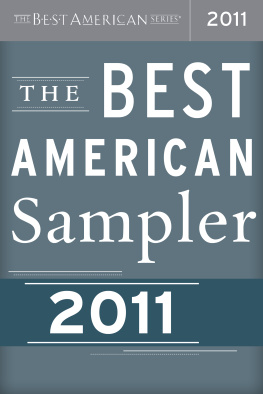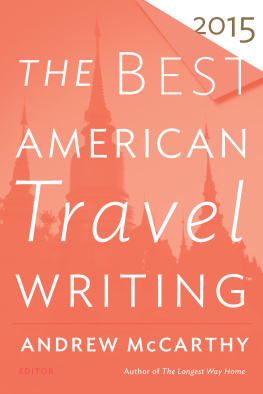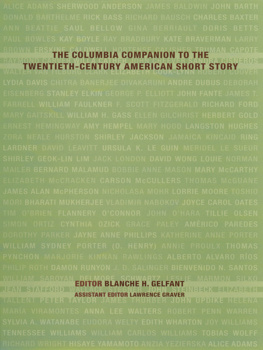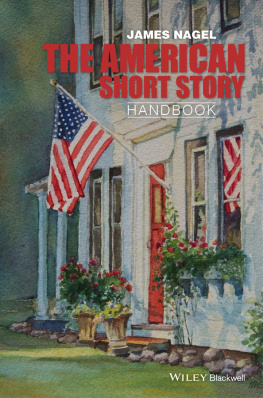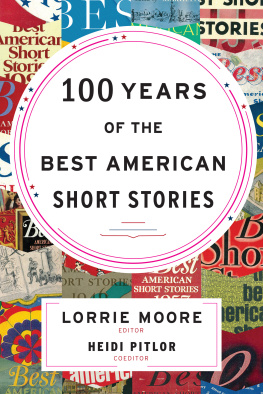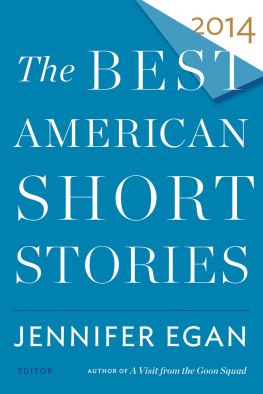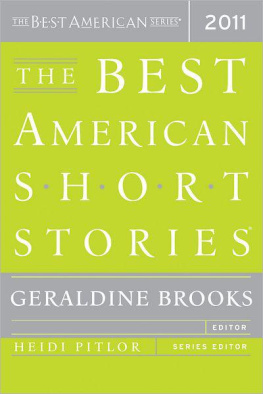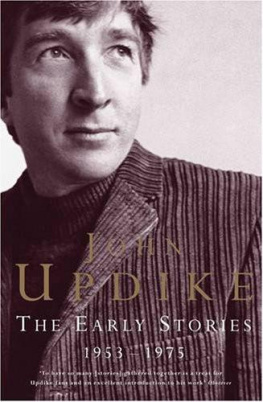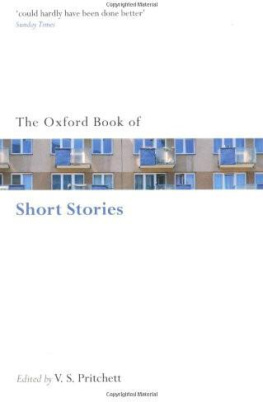TheBEST
AMERICAN
SHORT
STORIES
of the Century
John Updike EDITOR
Katrina Kenison COEDITOR
W I T H A N I N T R O D U C T I O N
B Y J O H N U P D I K E
H O U G H T O N M I F F L I N C O M P A N Y
B O S T O N N E W YORK
Contents
Foreword vii
Introduction by John Updike xv
1915 BENJAMIN ROSENBLATT. Zelig
1916 MARY LERNER. Little Selves 7
1917 SUSAN GLASPELL. A Jury of Her Peers 18
1920 SHERWOOD ANDERSON. The Other Woman 38
1922 RING LARDNER. The Golden Honeymoon 45
1923 JEAN TOOMER. Blood-Burning Moon 60
1927 ERNEST HEMINGWAY. T h e Killers 68
1929 WILLA CATHER. Double Birthday 77
1929 GRACE STONE COATES. Wild PlumS 100
1930 KATHERINE ANNE PORTER. T h e f t IO5
1931 WILLIAM FAULKNER. That Evening Sun Go Down 111
1931 DOROTHY PARKER. Here We A r e 127
1933 F. SCOTT FITZGERALD. Crazy Sunday 136
1934 ALEXANDER GODIN. My Dead Brother Comes to America 153
1935 WILLIAM SAROYAN. Resurrection of a Life 159
1938 ' ROBERT PENN WARREN. Christmas Gift 169
1939 RICHARD WRIGHT. Bright and Morning Star 179
1940 EUDORA WELTY. T h e Hitch-Hikers 211
1943 PAUL HORGAN. The Peach Stone 224
1944 VLADIMIR NABOKOV. "That in Aleppo Once ..." 241
1947 JEAN STAFFORD. The Interior Castle 250
1948 MARTHA GELLHORN. Miami-New York 264
1948 E. B. WHITE. The Second Tree from the Corner 281
1949 ' ELIZABETH BISHOP. The Farmer's Children 286
vi
CONTENTS
1951 j. F. POWERS. Death of a Favorite 295
1951 TENNESSEE WILLIAMS. The Resemblance Between a Violin Case and a Coffin 312
1955 ' JOHN CHEEVER. The Country Husband 325
1957 FLANNERY O'CONNOR. Greenleaf 348
i960 LAWRENCE SARGENT HALL. The Ledge 369
i960 PHILIP ROTH. Defender of the Faith 384
1962 STANLEY ELKIN. Criers and Kibitzers, Kibitzers and Criers 411
1964 BERNARD MALAMUD. The German Refugee 438
1967 JOYCE CAROL OATES. Where Are You Going, Where Have You Been? 450
1968 MARY LADD GAVELL. T h e Rotifer 466
1969 JAMES ALAN MCPHERSON. Gold Coast
1 9 7 0 ISAAC BASHEVIS SINGER. T h e K e y 4 9 3
1973 DONALD BARTHELME. A City of Churches 503
1 9 7 5 ROSELLEN BROWN. H o w t o W i n 5 0 7
1976 ALICE ADAMS. Roses, Rhododendron 520
1978 HAROLD BRODKEY. Verona: A Young Woman Speaks 533
1979 SAUL BELLOW. A Silver Dish 539
1980 JOHN UPDIKE. Gesturing 565
1981 CYNTHIA OZICK. T h e Shawl 576
1983 RAYMOND CARVER. Where I'm Calling From 581
1986 ANN BEATTIE. Janus 595
1987 SUSAN SONTAG. T h e Way We Live N o w 600
1987 TIM O'BRIEN. The Things They Carried 616
1989 ALICE MUNRO. Meneseteung 633
1990 LORRIE MOORE. You're Ugly, Too 652
1993 THOM JONES. I Want to Live! 671
1994 ALICE ELLIOTT DARK. In the G l o a m i n g 688
1994 CAROLYN FERRELL. Proper Library 705
1995 GISH JEN. Birthmates 720
1997 PAM DURBAN. Soon 735
1998 ANNIE PROULX. The Half-Skinned Steer 754
1999 PAM HOUSTON. The Best Girlfriend You Never Had 769
Biographical Notes 789
Index of the Best American Short Stories, 1915-1999 797
Foreword
EDWARD j. O'BRIEN was twenty-three years old, already a published poet and playwright, when he began work on the first volume of The BestAmerican Short Stories. He sold the idea to the Boston house of Small, Maynard & Company, which launched the series in 1915. "Because an American publisher has been found who shares my faith in the democratic future of the American short story as something by no means ephemeral,"
he wrote in his first introduction, "this yearbook of American fiction is assured of annual publication for several years."
Nearly eight-five years and eighty-five volumes later, the annual anthology that a young Harvard graduate envisioned on the eve of World War I has become not only an institution but an invaluable record of our century.
Although the series was briefly published by Dodd, Mead & Company before it became an integral part of the Houghton Mifflin list in 1933, it has been published without interruption every year since its inception.
In almost all respects, the world we now inhabit is vastly different from the world that is reflected in the earliest volumes. In the first years of the century, America was receiving tides of immigrants; indeed, immigration was perhaps the greatest human story of the time, and its themes reverber-ated in the stories O'Brien found. The orderly evolution of a national literature, as could be traced in a more homogeneous European culture, was nearly impossible to discern in the United States. But O'Brien saw virtue in our diversity, and while other critics of the time dismissed American fiction for its lack of sophistication and technique, he detected stirrings of something altogether new a distinctly American literature worth recognizing and encouraging on its own terms.
O'Brien sensed that the short story was about to come into its own as a particularly American genre, and he presciently set out, as he explained, "to viii
Foreword
trace its development and changing standards from year to year as the field of its interest widens and its technique becomes more and more assured."
If anything, O'Brien's ability to spot and crusade for quality fiction seems all the more remarkable from our vantage point. Upon Sherwood Anderson's first appearance in print, in 1916, O'Brien recognized both a new talent of the first rank and the real emergence of the modern short story. "Out of Chicago have come a band of writers, including Anderson, Ben Hecht, Lindsay, Masters, and Sandburg," he announced, "with an altogether new substance, saturated with the truth of the life they are experiencing."
Suddenly, it seemed, fiction was being written that was worthy of the devotion O'Brien was ready to bring to it. "This fight for sincerity in the short story is a fight that is worth making," he wrote in 1920. "It is at the heart of all that for which I am striving. The quiet sincere man who has something to tell you should not be talked down by the noisemakers. He should have his hearing. He is real. And we need him. That is why I have set myself the annual task of reading so many short stories."
The results of O'Brien's labors over the next twenty years are revealed in the roster of authors who found early recognition and support in his anthology, including Ring Lardner, Willa Cather, William Faulkner, J. P.
Marquand, Dorothy Parker, Erskine Caldwell, F. Scott Fitzgerald, Thomas Wolfe, William Saroyan, John Steinbeck, Irwin Shaw, Kay Boyle, and Richard Wright.
In 1923, O'Brien broke his own cardinal rule that only previously published short stories are eligible for consideration in order to publish a short story by a struggling young writer he had just met in Switzerland.
All of Ernest Hemingway's short stories to date had been rejected by editors; when he met O'Brien, he poured out a tragic tale of a lost suitcase full of manuscripts and admitted that he was so discouraged he was ready to give up writing. O'Brien asked to see the two stories he had left, and decided to publish one of them, "My Old Man." He not only gave Hemingway his first publication, he dedicated that year's volume to Hemingway, then a twenty-four-year-old reporter for the
Next page 
